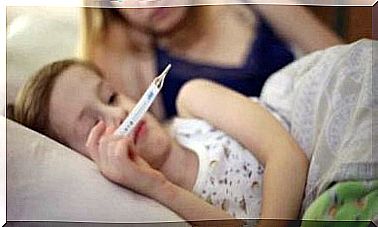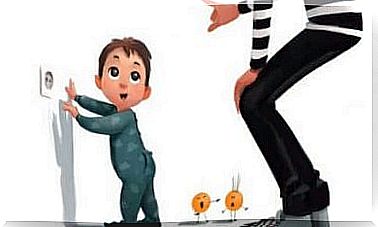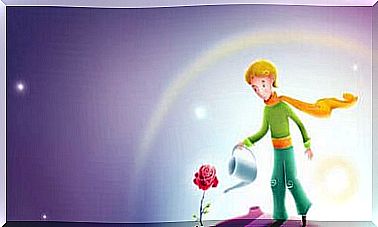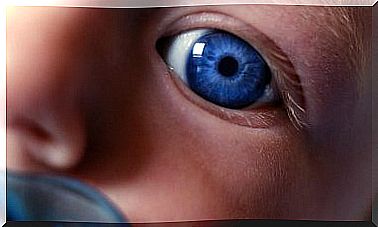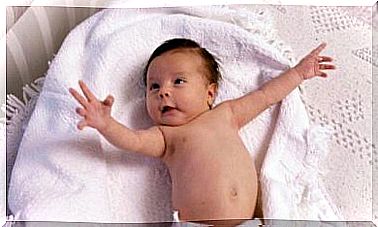Why Young Babies Shouldn’t Drink Water
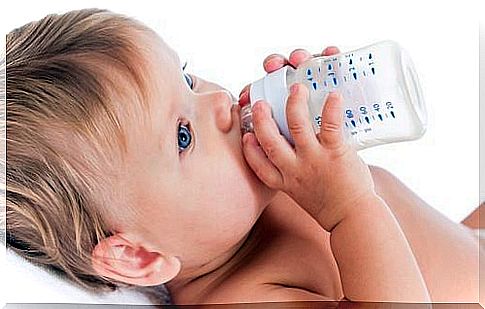
Should Babies Drink Water Before 6 Months Of Age? If the answer were obvious, we wouldn’t be asking this question. But many specialists advise against.
We know that water is a vital element for all living things. However, it is best to abstain from this for babies under 6 months.
Breast milk becomes a fundamental source of nutrition for babies from the moment they are born. This will be the case for many months to come.
Medical experts believe that all the nutrition and hydration babies need is provided by breastfeeding. Perhaps once they start receiving complementary foods, they can also start consuming water.
Why Babies Shouldn’t Drink Water Before 6 Months
The main reason babies shouldn’t drink water before 6 months is because they don’t need it. In fact, if it’s offered, they might even turn it down.
You should never force a baby to drink water; there is no reason to do this. It is normal for young babies not to drink water and there are no negative consequences.

Thirst is something that is easy to detect even in small children. When they are older and begin to talk, they are able to verbally communicate their thirst as well. In fact, it is one of the first things they learn to express in words.
But babies who are exclusively breastfed do not experience thirst. it’s a sensation that only occurs once babies start ingesting elements other than breast milk.
According to the experts, babies should only be fed breast milk until they are 6 months old. By exclusively we mean that’s the only thing babies should be ingesting.
Therefore, water is not the only thing your baby do not should give. You should not give your baby any other food or liquid before 6 months. Everything your baby needs in terms of nutrition and hydration, he gets through breast milk.
The World Health Organization lists two basic reasons for not giving water to your baby under 6 months old. The first, as we mentioned, is that they don’t need it. The second reason is that it can affect the way they eat.
According to the specialists, all the hydration your baby needs is in your breast milk. Drinking water can reduce the amount of breast milk your baby takes in.
On the rare occasion that a baby needs water, what kind should you give him?
In some exceptional cases, there are babies who do drink water before they are 6 months old. Sometimes this is simply due to a lack of information on the part of the parents. But it can also be caused by problems caused by fever or gastroenteritis.
If water is necessary, it is important to consider certain criteria that it must meet. For example:
- Only give your baby water that you are sure is safe to drink. It should contain little to no fluoride and should not come from lead pipes. Even if it’s considered safe to drink, you should still be careful. Boil it and wait for it to reach room temperature before giving it to your baby.
- Bottled water, while preferred, isn’t always the best option. Before giving bottled water to your baby, verify that it is low in fluoride, iodine, and nitrates. In general, the label will indicate whether the water is suitable for consumption by infants. You will also need to check if it has a low mineral content. Some moms make a habit of boiling bottled water as well.
When a baby starts a complementary diet, much of the food he starts eating will also have water in it. Soups, purees and juices provide your baby with a fair share of the hydration he needs. He will probably still be breastfed.
For that reason, your baby will only need small sips of water at this point. This will be enough to quench the thirst caused by the food he eats.
How can I be sure my baby doesn’t need to drink water?
You may not have known this before, but breast milk contains everything your baby needs. In fact , your child can also drink your breast milk simply out of thirst.
Let’s not forget that while your little one was still in the womb, he was hydrated in a completely different way. He didn’t know breast milk as a food until he was born.
If you pay special attention to it, you will see that in some cases your baby will only drink very small amounts of milk. These episodes may have more to do with thirst than hunger. Perhaps that explains why most babies reject water when you offer it. Their thirst has already been quenched.
Why would they want water when they have already filled their needs with their mother’s milk?
How can you tell if a baby wants to be fed from thirst rather than hunger? He will then want to feed outside of his normal routine. Also, he will drink only a little bit from each breast.
The most common view is that the baby does this out of thirst. The first milk that comes out of the breast is more watery than the milk that comes later. That’s why he only drinks a little bit from each side.
